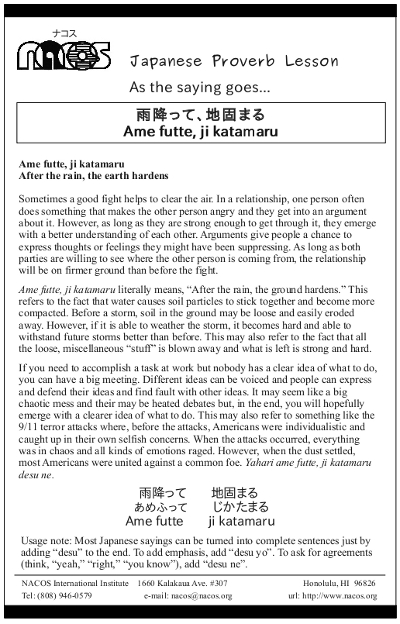Ame futte, ji katamaru
After the rain, the earth hardens
Sometimes a good fight helps to clear the air. In a relationship, one person often does something that makes the other person angry and they get into an argument about it. However, as long as they are strong enough to get through it, they emerge with a better understanding of each other. Arguments give people a chance to express thoughts or feelings they might have been suppressing. As long as both parties are willing to see where the other person is coming from, the relationship will be on firmer ground than before the fight.
Ame futte, ji katamaru literally means, “After the rain, the ground hardens.” This refers to the fact that water causes soil particles to stick together and become more compacted. Before a storm, soil in the ground may be loose and easily eroded away. However, if it is able to weather the storm, it becomes hard and able to withstand future storms better than before. This may also refer to the fact that all the loose, miscellaneous “stuff” is blown away and what is left is strong and hard.
If you need to accomplish a task at work but nobody has a clear idea of what to do, you can have a big meeting. Different ideas can be voiced and people can express and defend their ideas and find fault with other ideas. It may seem like a big chaotic mess and their may be heated debates but, in the end, you will hopefully emerge with a clearer idea of what to do. This may also refer to something like the 9/11 terror attacks where, before the attacks, Americans were individualistic and caught up in their own selfish concerns. When the attacks occurred, everything was in chaos and all kinds of emotions raged. However, when the dust settled, most Americans were united against a common foe. Yahari ame futte, ji katamaru desu ne.
Usage note: Most Japanese sayings can be turned into complete sentences just by adding “desu” to the end. To add emphasis, add “desu yo”. To ask for agreements (think, “yeah,” “right,” “you know”), add “desu ne”.


